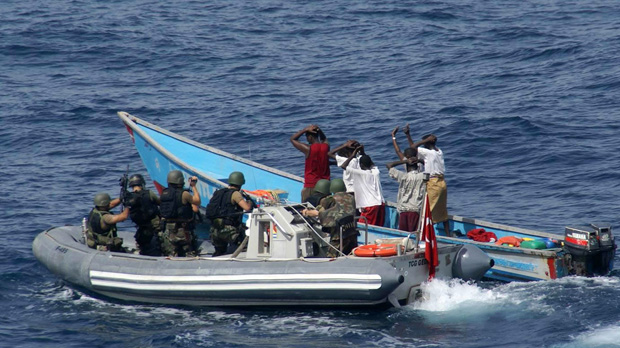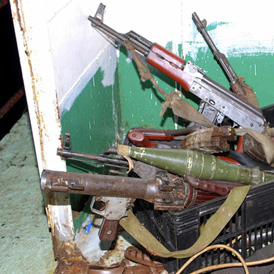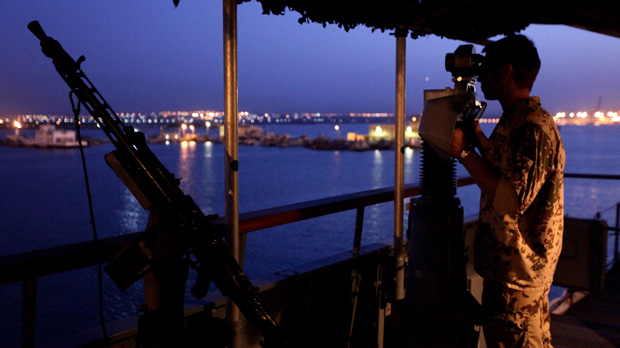Somali pirate ransoms top £3m as report demands action
As British private security companies queue up to offer armed guards to counter pirate attacks off Somalia, a government report calls for tighter regulation of a flourishing industry.

The report into Somali piracy by the foreign affairs committee comes at a time when the problem has become relatively stable.
It pointed out that there are more than sixty firms offering armed maritime protection for the region and said the government “should not offload responsibility onto ship owners to deal with the most difficult aspects of handling private armed guards”.
There is a danger that unless unequivocal guidance is produced, then we may once again give pirates the upper hand. Peter Cook
The report said “the guidance on the use of force, particularly lethal force, is very limited” and that the government must not leave guidance on the use of potentially lethal force “to private companies to agree upon”.
Currently 172 hostages are being held by Somali pirates from 10 vessels. According to figures from the International Maritime Bureau’s Piracy Reporting Centre, the number of attacks has increased but the number of successful hijackings has fallen. Perhaps because of the reduction in the number of vessels captured, pirates have sought to maximise their income by increasing ransoms.
The average payment has increased from $600,000 (£387,000) in 2007 to $4.7m (£3m) now and the global cost of piracy has been estimated at between $8bn and $12bn and in human terms. An increase in violence by the pirates including reports of torture has led to hostages being killed.
No government regulation
The government announced in October that as a “short term measure” it would allow boats transiting the piracy hotspot of the waters off Somalia to use armed security, but it also said it would not regulate such services despite effectively giving the green light to operate.
Land-based private security companies have been pushing for years for government regulation but this has failed to happen.
One of the issues with state regulation is that it can cause a government to become associated with the actions of private companies sometimes operating in conflict zones, behaviour from which it may often prefer to distance itself.
Recently there has been a proliferation of the number of companies, often staffed by former Royal Marines, offering maritime security services. Regulation of the sector has become a more pressing issue following the announcement that these teams may now carry firearms.

The industry’s membership organisation, the Security Association for the Maritime Industry (SAMI) has been calling on the government to help the sector to operate safely and to help it root out the so-called cowboy operators which legitimate companies say are damaging their reputation.
SAMI has responded positively to the committee’s report saying the government must now act on the recommendations. Its founder Peter Cook told Channel 4 News: “There is a danger that unless unequivocal guidance is produced, then we may once again give pirates the upper hand.
“When pirates approach vessels on which armed guards are unsure whether they can fire, then without clear and decisive guidance, there is a danger we may emasculate the very frontline solution which is currently keeping piracy at bay”.
Currently other tactics available to shipowners include water jets, the use of locked safe rooms known as citadels and technology such as sonic deterrents and the application of “industry best practice” including the use of CCTV, alarms and even simply having an emergency plan should a ship come under pirate attack.
In addition, security firms have their own strategies for the safe navigation of pirate-infested waters. One of the largest providers, Drum Cussac told Channel 4 News: “All of our teams on transits are supported by our own proprietary Risk Assessment software called APTAS (Automated Piracy Threat Assessment System) which analyses piracy activity over their given route and is backed up by a sophisticated vessel monitoring system and manned response centre”.

One of the problems companies face using armed guards is that should the guards disembark at journey’s end, they could face legal problems under arms import legislation. The Foreign Affairs Committee report wants to see more work carried out to untangle such jurisdictional issues.
Some industry figures say there are already signs the industry and government are responding to the problems posed by piracy off Somalia. Lloyds insurers are set to launch a private navy (or Convoy Escort Programme) early in 2012 as part of a package of measures to mitigate the risks incurred when crossing pirate hotspots.
Independent maritime security consultant Paul Gibbins told Channel 4 News “Private security companies will possibly see a greater level of regulation either by the state or by the industry itself. That has already begun with for example the Department of Transport’s regulation of the transportation of weapons.
“Shipping Companies are also now conducting more thorough due diligence on the security companies they use. The flag states of the ships are also making more demands on companies providing private security services.”
He thinks that despite this and the drop in the number of successful hijackings, we should not be complacement that we are winning the war against the pirates: “Pirates are not stupid. In the past they have shown they can change tactics to adapt to the changing security situation and I think they will respond to current measures. Will they change tactics? It’s guesswork but it’s reasonable to assume based on anecdotal evidence that they will though what those new tactics will be is hard to say. They may for example develop the capacity to operate at night which they tend not to at present.”
How much of the report is adopted will be revealed when the government gives its response.